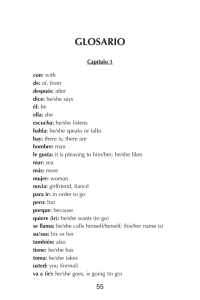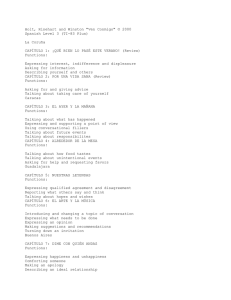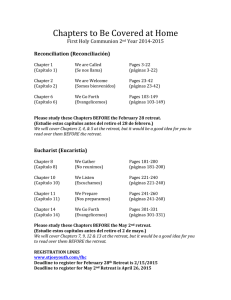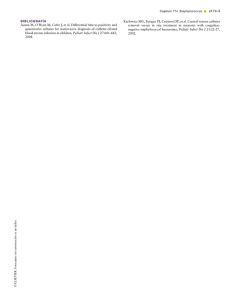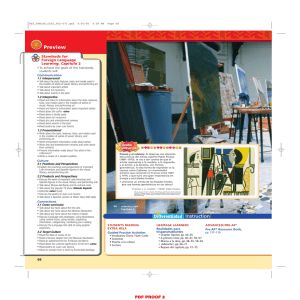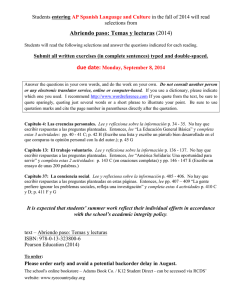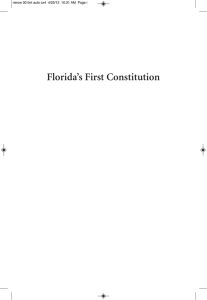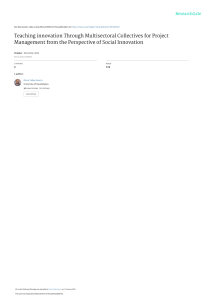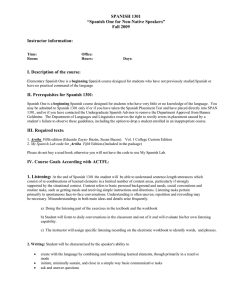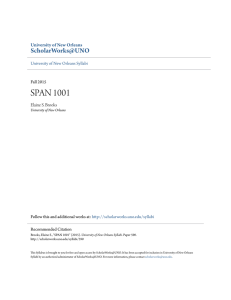Latin American Culture and Civilization
Anuncio
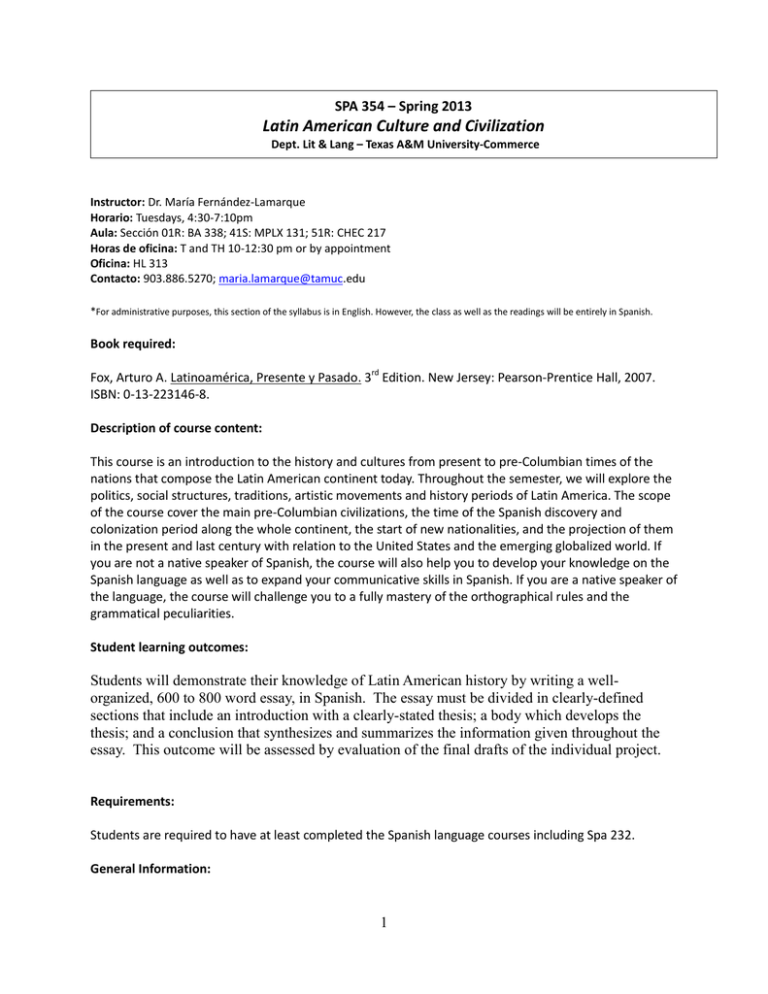
SPA 354 – Spring 2013 Latin American Culture and Civilization Dept. Lit & Lang – Texas A&M University-Commerce Instructor: Dr. María Fernández-Lamarque Horario: Tuesdays, 4:30-7:10pm Aula: Sección 01R: BA 338; 41S: MPLX 131; 51R: CHEC 217 Horas de oficina: T and TH 10-12:30 pm or by appointment Oficina: HL 313 Contacto: 903.886.5270; maria.lamarque@tamuc.edu *For administrative purposes, this section of the syllabus is in English. However, the class as well as the readings will be entirely in Spanish. Book required: Fox, Arturo A. Latinoamérica, Presente y Pasado. 3rd Edition. New Jersey: Pearson-Prentice Hall, 2007. ISBN: 0-13-223146-8. Description of course content: This course is an introduction to the history and cultures from present to pre-Columbian times of the nations that compose the Latin American continent today. Throughout the semester, we will explore the politics, social structures, traditions, artistic movements and history periods of Latin America. The scope of the course cover the main pre-Columbian civilizations, the time of the Spanish discovery and colonization period along the whole continent, the start of new nationalities, and the projection of them in the present and last century with relation to the United States and the emerging globalized world. If you are not a native speaker of Spanish, the course will also help you to develop your knowledge on the Spanish language as well as to expand your communicative skills in Spanish. If you are a native speaker of the language, the course will challenge you to a fully mastery of the orthographical rules and the grammatical peculiarities. Student learning outcomes: Students will demonstrate their knowledge of Latin American history by writing a wellorganized, 600 to 800 word essay, in Spanish. The essay must be divided in clearly-defined sections that include an introduction with a clearly-stated thesis; a body which develops the thesis; and a conclusion that synthesizes and summarizes the information given throughout the essay. This outcome will be assessed by evaluation of the final drafts of the individual project. Requirements: Students are required to have at least completed the Spanish language courses including Spa 232. General Information: 1 SPA 354 meets one day a week. The peculiarity is the interaction of this course among three sections located in different classrooms (Commerce, Mesquite and CHEC). The class will always be televised to either two of the campuses. Students who do not have the physical presence of the instructor in their classroom will have to interact through the screen and adjust to this class settings. The class format consists of short lectures provided by your instructor followed by group activities performed in class with your peers. Discussions and interaction is expected through the lecture and the reviewing of the class work. Time for student presentations is reserved in the second part of the class. E-College: This course is associated with an E-College site containing information regarding the course content. You are expected to check this site in order to complete the quiz for every chapter previous to come to class. You will also send your papers through this via. Attendance policy: Attendance is mandatory. Frequent absenteeism (more than one absence) will result in deduction of points from the final grade. Absences due to documented medical reasons are excused. In light of recent disclosures about the forgery of such notes, I may have to call the doctor's office. Whether an absence is excused or not, it is the student's responsibility to make up missed work. The only absences that do not count beyond the one allowed are those resulting from required participation in university events, hospitalization, or family emergencies of which the instructor has been notified by university officials. A tardy or leaving class early equals 1/3 of an absence. Late work is not accepted. Only in extenuating circumstances make-up exams could be arranged before the date of the absence. Cell phones are turned off during class. Assignments and grading scale: Midterm Exam - 20% Final Exam - 20% Quizzes - 10% In class groupwork - 15% Response paper (4) - 20% Presentations (2) - 10% Participación - 5% A = 100-90 B = 89-80 C = 79-70 D = 69-60 F = 59 Midterm and Final exams: Each of the exams will cover the contents of the classes and chapters previous to the dates of the exams. Both exams will consist on questions to answer specific information and to develop your own arguments. They are graded based on content and grammar/orthography accuracy. Quizzes: There are quizzes to be completed on E-College previous to each class. Students are to complete them as they are open to access through E-College during the morning and afternoon of every Tuesday when the class meets. They are graded based on content and grammar/orthography accuracy. 2 In class groupwork: Following the lectures and possible discussions, students get in groups of two people to complete the sections Ejercicios y actividades at the end of every chapter. The section consists of the following parts: Preguntas sobre la lectura, Opiniones, and Hipótesis. The last two sometimes appear as one only. Responses are to be read and discussed by all. Students will be receive a grade for this task. Response papers: There are four response papers to be turned in during the semester. The due dates can be found in the calendario del semestre. The topics are those from Tema para composición found in the Ejercicios y actividades section by the end of each chapter. The compositions are grouped under the next chapter selection: Composition 1, chapters 1 to 4; composition 2, chapters 5 to 7; composition 3, chapters 8 to 11; composition 4, chapters 12 to 17. Characteristics: No less that 400 words and no more than 500, double-spaced typed paper in Spanish. Letter font and size: Times New Roman, 12. Write your name, class, instructor’s name, assignment name on the top left hand side of the paper. Compositions are graded based on content and grammar/orthography accuracy. Response papers are to be turned in through E-College. Presentations: Every student presents on different topics two times at the semester. First presentation will consist in one of the sections of each chapter as stated in the class calendar. Student should present it to the class conveying main points of the section and promoting the discussion of the topic. The second presentation is announced in the class calendar as Investigación de asuntos políticos que ocurran en la actualidad de Latinoamérica. Students should do newspaper research and bring to their presentation the most recent political news of any place of their choice in Latin America at the current moment of their presentation. Example: last month of June/July there was a coup d’état in Honduras. I would expect students presenting on such event, because it has happened during the current semester. Presentation contents are part of the class, and such, you may expect questions out of them in the exams. Students are also expected to engage in the presentations by participating in the Q&A section following. Participation: Students are expected to come to class prepared to actively participate in all class activities and discussions. Your participation will be evaluated weekly with 100 points possible for the final participation grade. Use of cell phones is considered against your participation in class. Turn them OFF. Cell Phones and Electronic Devices: The use of cell phones and electronic devices is prohibited in class. All cell phones should be turned OFF before the start of class. It is not valid to set them to vibrate or low volume. They have to be turned OFF. If you are expecting a call for an anticipated emergency, you should inform your instructor before class. Cell phone and other wireless signals extremely disrupt the transmission of the videoconferencing equipment. Having digital equipment activated in the classroom causes a loud screeching noise heard through the speakers on the other campus. Therefore, any electronic devices must be turned OFF prior to arriving to the classroom. Not following this requirement may cause the student dismissal from the 3 class and counted as being absent. E-Culture Policy: When dealing with faculty over e-mail, it is important that students keep the following in mind: 1. Always use the Tamu-c e-mail account to communicate with your instructor. Messages from any other e-mail accounts will not be considered. 2. Always use salutations and signatures. Be courteous. 3. For serious matters use e-mails to facilitate a mutually agreeable time to meet. E-mail should not be used to avoid personal interaction. 4. Never use e-mail to vent or to respond immediately to an emotional situation. 5. Remember that e-mail creates a documentary record of one's communication with others. Statements to students required by the University and the Department of Literature and Languages: Behavior: All students enrolled at the University shall follow the tenets of common decency and acceptable behavior conducive to a positive learning environment. (See Student’s Guide Handbook, Policies and Procedures, Conduct) Americans with Disabilities: The Americans with Disabilities Act (ADA) is a federal anti-discrimination statute that provides comprehensive civil rights protection for persons with disabilities. Among other things, this legislation requires that all students with disabilities be guaranteed a learning environment that provides for reasonable accommodation of their disabilities. If you have a disability requiring an accommodation, please contact: Office of Student Disability Resources and Services Texas A&M University-Commerce Gee Library Room 132 Phone (903) 886-5150 or (903) 886-5835 Fax (903) 468-8148 E-mail: <StudentDisabilityServices@tamu-commerce.edu> Academic Honesty: Plagiarism is borrowing the work of others and not giving credit where credit is due. It is unethical and reflects very poorly on a person’s character. Copying someone else's work, or asking a friend or tutor to write your compositions constitutes a violation of academic honesty policy. Likewise, the use of electronic media to translate your work to Spanish is also unacceptable. Instructors in the Department of Literature and Languages do not tolerate plagiarism and other forms of academic dishonesty. Instructors uphold and support the highest academic standards, and students are expected to do likewise. Penalties for students guilty of academic dishonesty include disciplinary probation, suspension, and expulsion. (Texas A&M University-Commerce Code of Student Conduct 5.b[1,2,3]). Students who engage in plagiarism and copying acts that deserve official disciplinary actions are subject to academic sanctions. 4 Calendario del semestre 14 de enero 21 de enero Comienzo del semestre Spring 2013 Primer día de clase: Presentación del curso. Capítulo 1 – Las grandes civilizaciones precolombinas: trabajo en clase Capítulo 2 – Las grandes civilizaciones precolombinas (II): trabajo en clase Presentaciones: Secciones 2.3; 2.4i-ii; 2.4iii-iv (3) 4 de febrero Capítulo 3 – Europa en la época del descubrimiento de América ONLINE CLASS 11 de febrero Capítulo 4 – La conquista de la América Hispana Presentación: Secciones 4.3; 4.4; 4.5 18 de febrero Capítulo 5 y 6 – El sistema colonial; y Sociedad, vida y cultura en el mundo colonial Presentación: Secciones 5.7 y 6.6 (2) Turn in Composition 1 25 de febrero Capítulo 7 – El siglo XIX: la independencia y sus consecuencias Presentación: Sección 7.9; 7.10; 7.11 4 de marzo Capítulo 8 – Latinoamérica a vista de pájaro Turn in Composition 2 ONLINE CLASS 10-14 marzo SPRING BREAK 18 de marzo Midterm Exam: comprende capítulos 1 a 8. 25 de marzo Capítulo 9 – El siglo XX: Panorama latinoamericano ONLINE Capítulo 10 y 11 – La escena cultural hasta y desde la Segunda Guerra Mundial 1 de abril 8 de abril Capítulo 12 – Centroamérica y México Presentación: Investigación de asuntos políticos que ocurran en la actualidad de Latinoamérica Turn in Composition 3 5 15 de abril Capítulo 13 y 14 – El área del Caribe; y La Hispanoamérica andina Presentación: Investigación de asuntos políticos que ocurran en la actualidad de Latinoamérica 22 de abril Capítulo 15 – Los países del cono sur Presentación: Investigación de asuntos políticos que ocurran en la actualidad de Latinoamérica 29 de abril Capítulo 16 – El norte de Suramérica ONLINE Capítulo 17 – Los hispanos en Estados Unidos Presentación: Investigación de asuntos políticos que ocurran en la actualidad de Latinoamérica Turn in Composition 4 6 de mayo 13 de mayo Final Exam: comprende capítulos 9 a 17. NOTA: Este programa de clase está sujeto a cambio debido a imponderables que se presenten durante el semestre. 6
